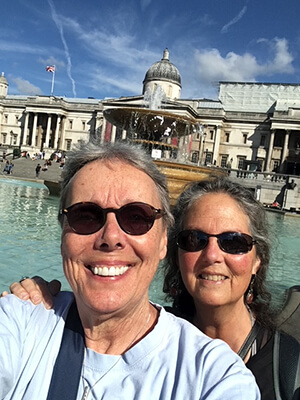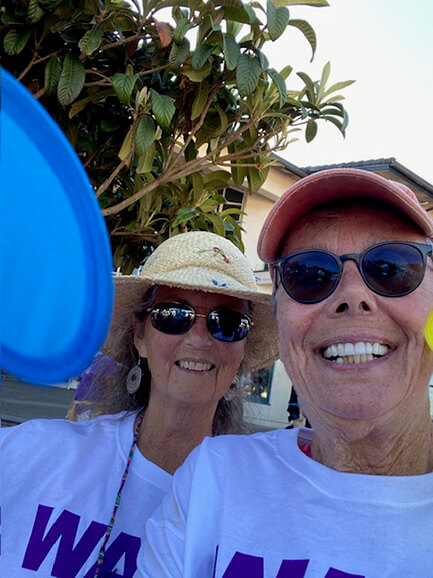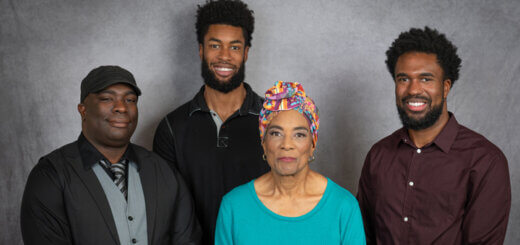Diagnosed with MCI: How one LGBTQ+ couple found acceptance and support through community
By Anjali Sadarangani
After Julie was diagnosed with mild cognitive impairment (MCI), she and her wife, Jane, made an effort to make the best of the situation. Unsure of what to do other than lifestyle changes, they contacted the Alzheimer’s Association for help. Through the Association they were connected to support groups and were asked to speak at the Alzheimer’s Association Walk to End Alzheimer’s®. Julie’s experience with the Association helped her accept her diagnosis and guided her to educate others about MCI.
Their Love Story’s Beginning
Jane and Julie first met in February 1995 while Julie was working at a local bookstore in Pacific Grove. Over a meaningful conversation about the movie Serving in Silence, featuring Lt. Col. Margaret Cammermeyer, who came out as gay – their connection was mutual.
“I went in to look for the book [Serving in Silence],” said Jane. “Julie [who worked at the store] said to me, ‘That was a good movie for us.’ Did I pay attention to the ‘for us?’ No. But a week later I went back to look for her and it was her day off.”
Julie continues the story, “[I called her and said], ‘Hello this is Julie. I don’t mean to be presumptuous, but would you like to have coffee?”
Jane adds, “That was March 26, 1995. That was the beginning and we’ve been together ever since.”
The couple married in September 2008.
Receiving a Diagnosis
Jane noticed memory lapses in Julie in February 2023, which started in the form of forgetting previous conversations, and eventually manifesting into confusion as to dates and times.
On more than one occasion, Jane noticed that she “wasn’t having normal conversations with Julie” and these abnormalities even extended behaviorally. “Julie misplaced a baked potato that she was wanting to place in the oven,” said Jane. “She got it all ready and put it in the fridge.”
Jane and Julie decided together to seek out professional help. Julie recalls taking “a variety of tests dealing with memory, diagrams, and memory via words and sentences and not doing very well.” After these memory task assessments and consultation with a neurologist, Julie was diagnosed with MCI in May 2023.
MCI is an early stage memory loss condition that causes noticeable cognitive impairments and about one-third of these patients develop dementia. It is estimated that 12% to 18% of people age 60 or older are living with MCI.
Julie described the diagnosis as “somewhat shocking, as I was aware that my memory was not as sharp as it used to be. Even though I didn’t have a clear idea of what would follow,” both she and Jane took a proactive approach.
A Proactive Approach
Making lifestyle changes can significantly impact brain health, and in many cases, disease progression. Some of these strategies include engaging in regular exercise, eating healthier foods, and learning something new.
Similarly, Julie recalls how “Jane set up calendars on the inside of the front door” in an effort to help Julie with remembering what day it was and what was on the daily schedule. Following advice on the extensive benefits of exercise on the brain, Julie swims 70 laps two times a week and walks six to eight miles a week. Jane and Julie both also engage in crosswords and other brain games, all in the hopes of slowing disease progression.
Walk to End Alzheimer’s
Jane and Julie reached out to their local Alzheimer’s Association in Monterey. There they were connected with Yuliana Mendoza-Flores, a family care specialist there. After hearing their story, she suggested Julie speak at Walk to End Alzheimer’s in Monterey.
Held annually in the fall, Walk to End Alzheimer’s is the world’s largest fundraiser for Alzheimer’s care, support, and research. An important component is the Promise Garden – a hands-on experience where participants raise flowers to represent their promise to remember, honor, and fight for Alzheimer’s. In this ceremony, each colored flower represents the diverse motivations for those at the walk. The blue flower specifically signifies an individual who is currently living with Alzheimer’s disease or dementia.
On stage last year, Julie proudly held up the blue flower, which represents someone living with the disease. Despite initially being hesitant to open up about her condition, Julie’s involvement in the Association helped her engage in conversations with her loved ones.
“Being able to stand on the podium and feel such an overwhelming amount of support,” said Julie. “All our friends came to support me and to give me a hug. It was quite empowering to stand amongst people supporting their loved ones.”
Connecting people to support
Jane and Julie wish that Walk would happen twice a year, as they feel it is that important of a cause. “It is so important; it should be in the public eye. There are so many families affected,” said Jane. “Alzheimer’s is like a secret disease. It’s a silent disease, like maybe we shouldn’t tell anyone. [Walk] brings supporters, spouses, and friends [of the person with the disease] and connects them to mutual comfort and support.”
They couple found their experience with Walk to be extremely rewarding. Before being asked to speak at Walk, Julie didn’t want anyone to know about the disease. “Prior to Walk, Julie said to me, ‘Don’t tell anyone,’” said Jane. “That was one of the most difficult and impossible things to carry within me. I could not unburden my feelings to my loved ones.
“[Then] Julie talks to someone from the Association, hangs up the phone and said, ‘I’m going to speak at the walk.’ I asked, ‘Well now can I tell my friends?’ and she said, ‘I guess so.’ It takes a brave person to be able to say ‘I have MCI.’”
Finding a Community
Julies conversation with Yuliana also resulted in her being connected to a local support group. For individuals and couples facing MCI, support groups can be crucial to providing a sense of community. For Jane and Julie, discovering Openhouse, an LGBTQ+ support group based in San Francisco that partners with the Alzheimer’s Association, proved to be transformative.
Through online meetings with individuals from around the country, Jane and Julie found a network that understood their unique challenges as an LGBTQ+ couple. For Jane, this community has provided a space where she “has the freedom to say anything and everything without being judged.”
LGBTQ+ Cultural and Nuanced Support
From personal experience, Jane and Julie have noticed that support groups for Alzheimer’s within the LGBTQ+ community hold unique relevance because they feel that the dynamics of the group are different than a support group not geared specifically towards the LGBTQ+ communities. Jane has observed that in many support groups, men often don’t communicate openly with their wives about dementia due to fear or denial.
In contrast, Jane and Julie, as a same-sex couple, find it somewhat easier to discuss these tough issues, even if the conversations are excruciatingly difficult. This ability to communicate openly is crucial for navigating the complexities of Alzheimer’s.
Jane and Julie hope to meet other individuals within this community going through similar experiences. Providing there is enough interest in the Monterey, they are considering working with the Association to create a dedicated LGBTQ+ and MCI support group.
Advice for caregivers
Jane’s advice for caring for someone living with MCI begins with open and daily communication. She emphasizes the importance of developing systems to stay organized and sharing the diagnosis with friends and family for support.
Jane also advises seeking help and information to maintain stability and positivity. Acknowledging her own struggle with patience, she highlights the need to monitor her tone, take deep breaths, and focus on self-care while striving to be the best caregiver possible.
Walk season happens every fall, and now is the perfect time to get started. Start your own team for Walk to End Alzheimer’s – Monterey on October 19, 2024. Not in Monterey County? Find a Walk near you at alz.org/walk.
For resources and information on dementia in the LGBTQ+ community visit alz.org/lgbt.




















